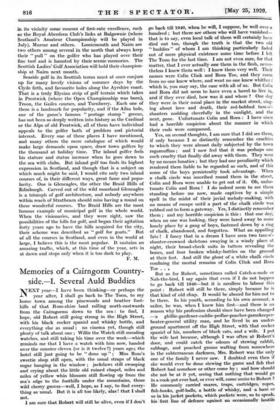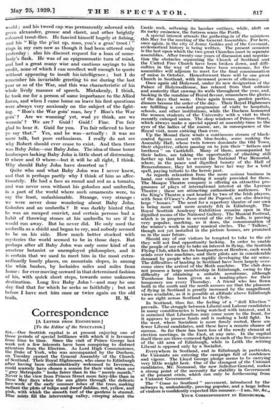Memories of a Cairngorm Country- side. — I. Several Auld Buddies N EXT
year—I have been thinking—or perhaps the year after, I shall go back to The Toon, to my home town among the pinewoods and heather foot- hills of that Ross-shire land rolling north-eastwards from the Cairngorms down to the sea : to find, I hope, old Robert still going strong in the High Street, with his black cocker spaniel and whisky bottle, and everything else as usual ; no cinema yet, though still plenty of talk about one ; Willie the Watch still mending watches, and still taking his time over the work—which reminds me that I have a watch with him- now, handed over the counter eleven (or is it twelve?) years ago; the hotel still just going to be " done up " ; Miss Ross's sweetie shop still open, with the usual straps of black sugar hanging in the window ; jackdaws still swooping and crying about the little old ruined chapel, miles and miles of yellow whin blossom still flowing up from' the sea's edge to the foothills under the mountains, those wild cherry groves—well, I hope, as I say, to find every- thing as usual. But it is all too likely, alas I that I shall not.
I am sure that Robert will still be alive, even if I don't go back till 1940, when he will, I suppose, be well over a hundred ; but there are others who will have vanished—. that is to say, even local talk of them will certainly have died out too, though the truth is that the two old " buddies" of whom I am thinking particularly faded out of mere physical existence some time before I left The Toon for the last time. I am not even sure, for that matter, that I ever actually saw them in the flesh, never- theless I knew their well': I knew them very well. Their names were Colin Clink and Rora Toe, and they came from no one knew where, and went no one knew whither which is, you may say, the case with all of us. But Colin and Rora did not seem to have even a hovel to live in, and if they ever died, how was it and where ? One day they were in their usual place in the market street, sing. ing about love and death, their red-bobbed tam-o'- shanters nodding cheerfully in the sunlight, and the next, gone. Unfortunate Colin and Rora : I have since had a horrible suspicion about the manner in which their ends were compassed.
Yes, on second thoughts, I am sure that I did see them, if only because I so distinctly remember the cruelties to which they were almost daily subjected by the town ragamuffins ; and I now feel that it was perhaps one such cruelty that finally did away with them. They were by no means lunatics ; but they had one peculiarity which rendered them liable to be regarded as such, and of this some of the boys persistently took advantage. When a chalk circle was inscribed round them in the street, Colin and Rora were unable to get out of it. Oh, unfor- tunate Colin and Rora ! I do indeed seem to see them standing before me now, made captives by a simple spell in the midst of their jovial melody-making, with. no means of escape until a part of the chalk circle was rubbed out to form a gateway. Yes, I distinctly remember them ; and my horrible suspicion is this : that one daY, when no one was looking, they were lured away to some lonely place by a gang of boys, fastened down by a ring of chalk, abandoned, and forgotten. What an appalling' fate 1 I fancy that in a dream I have seen two tarn-o'- shanter-crowned skeletons swaying in a windy place at night, their broad-check suits in tatters revealing the bones, and four broken whisky-bottles on the ground at their feet. And still the ghost of a white chalk circle confining the mortal remains of Colin Clink and Rora Toe . .
But as for Robert, sometimes called Catch-a-mole or Nab-the-bird, I say again that even if I do not happen to go back till 1940—but it is needless to labour this point : Robert will still be there, simply because he is that kind of old chap. It would be absurd for him not to be there. In his youth, according to his own account, a sailor, he was, when I knew him first—and there is no reason why his profession should since have been changed ghillie-gardener-caddie-pedlar-poacher-gamekeeper- beater-general utility man, and he lived in an under- ground apartment off the High Street, with that cocker spaniel of his, numbers of black cats, and a wife. I put the wife last because, although I was often at• Robert's door, and could catch the odours of stewing rabbit, cabbage, and poached grouse wafting from somewhere in the subterranean darkness, Mrs. Robert was the only one of the family I never saw. I doubted even then if she would ever be done stewing the game and fish that Robert had somehow or other come by ; and how should she not be at it yet, seeing that nothing that would go in a cook-pot ever had, or ever will, come amiss to Robert ? He commonly carried snares, traps; cartridges, ropes, fish-hooks, golf-balls, a bottle of whisky, and a hare or so in his jacket pockets, which pockets were, so to speak, his first line of defence against an occasionally hostile world ; and his tweed cap was permanently adorned with green alexander, grouse and claret, and other brightly coloured trout-flies. He fancied himself hugely at fishing; and his " Kip the p'int up, man, yon's a gran' trooti rings in my ears now as though it had been uttered only yesterday : also his discreet request for a loan of some- body's flask. He was of an epigrammatic turn of mind, and had a great many wise and cautious sayings to his credit, none of which I can recollect well enough to quote without appearing to insult his intelligence ; but I do remernber his invariable greeting to me during the last year or so of the War, and this was characteristic of his whole lively manner of speech. Mistakenly, I think, he took me for a person of some importance to the Allied forces, and when. I came home on leave his first questions were always very anxiously on the subject of the fight- ing. " Hoo's the War goin' man, hey ? Hoo's the War goin' ? Are we wunning' yet, wud ye think, are we wunnin' ? We are I Guid Guid ! Fine. I'm fair glad to hear it. Guid for you. I'm fair relieved to hear ye say that." Yes, and he was—actually : it was no mere talk, but pure enthusiasm. I really do not see why Robert should ever cease to exist. And then there was Baby John—our Baby John. The idea of those home landscapes lacking Baby John is little short of distressing. 0 where and 0 where—but it will be all right, I think. Why should Baby John have deserted us ?
Quite who and what Baby John was I never knew, and that is perhaps partly why I think of him so affec- tionately. He had a face as round and red as a tomato, and was never seen without his goloshes and umbrella, in a part of the world where such ornaments were, to say the least, unfashionable. Strange, very strange : we were never done wondering about Baby John. Goloshes and an umbrella ? It was darkly hinted that he, was an escaped convict, and certain persons had a habit of throwing stones at his umbrella to see if he would run away. But he never did. He only used the umbrella as a shield and began to cry, and nobody seemed to be on his side. How much better stocked with mysteries the world seemed to be in those days. But perhaps after all Baby John was only some kind of an amateur botanist or unemployed philosopher, and it is certain that we used to meet him in the most extra- ordinarily lonely places, on mountain slopes, in among the whin bushes, by lochsides miles and miles from home : for ever moving onward in that determined fashion of his, with quick short steps, towards some unknown destination. Long live Baby John !—and may he one day find that for which he seeks so faithfully ; but not before I have met him once or twice again on the old









































 Previous page
Previous page